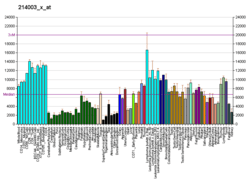40S ribosomal protein S20
40S ribosomal protein S20 is a protein that in humans is encoded by the RPS20 gene.[5][6][7]
Ribosomes, the organelles that catalyze protein synthesis, consist of a small 40S subunit and a large 60S subunit. Together these subunits are composed of 4 RNA species and approximately 80 structurally distinct proteins. This gene encodes a ribosomal protein that is a component of the 40S subunit. The protein belongs to the S10P family of ribosomal proteins. It is located in the cytoplasm. This gene is co-transcribed with the small nucleolar RNA gene U54, which is located in its second intron. As is typical for genes encoding ribosomal proteins, there are multiple processed pseudogenes of this gene dispersed through the genome.[7]
References
- GRCh38: Ensembl release 89: ENSG00000008988 - Ensembl, May 2017
- GRCm38: Ensembl release 89: ENSMUSG00000028234 - Ensembl, May 2017
- "Human PubMed Reference:". National Center for Biotechnology Information, U.S. National Library of Medicine.
- "Mouse PubMed Reference:". National Center for Biotechnology Information, U.S. National Library of Medicine.
- Kenmochi N, Kawaguchi T, Rozen S, Davis E, Goodman N, Hudson TJ, Tanaka T, Page DC (Aug 1998). "A map of 75 human ribosomal protein genes". Genome Res. 8 (5): 509–23. doi:10.1101/gr.8.5.509. PMID 9582194.
- Chu W, Presky DH, Swerlick RA, Burns DK (May 1993). "Human ribosomal protein S20 cDNA sequence". Nucleic Acids Res. 21 (7): 1672. doi:10.1093/nar/21.7.1672. PMC 309385. PMID 8479924.
- "Entrez Gene: RPS20 ribosomal protein S20".
Further reading
- Wool IG, Chan YL, Glück A (1996). "Structure and evolution of mammalian ribosomal proteins". Biochem. Cell Biol. 73 (11–12): 933–47. doi:10.1139/o95-101. PMID 8722009.
- Kato S, Sekine S, Oh SW, et al. (1995). "Construction of a human full-length cDNA bank". Gene. 150 (2): 243–50. doi:10.1016/0378-1119(94)90433-2. PMID 7821789.
- Kiss-László Z, Henry Y, Bachellerie JP, et al. (1996). "Site-specific ribose methylation of preribosomal RNA: a novel function for small nucleolar RNAs". Cell. 85 (7): 1077–88. doi:10.1016/S0092-8674(00)81308-2. PMID 8674114.
- Vladimirov SN, Ivanov AV, Karpova GG, et al. (1996). "Characterization of the human small-ribosomal-subunit proteins by N-terminal and internal sequencing, and mass spectrometry". Eur. J. Biochem. 239 (1): 144–9. doi:10.1111/j.1432-1033.1996.0144u.x. PMID 8706699.
- Yoshihama M, Uechi T, Asakawa S, et al. (2002). "The Human Ribosomal Protein Genes: Sequencing and Comparative Analysis of 73 Genes". Genome Res. 12 (3): 379–90. doi:10.1101/gr.214202. PMC 155282. PMID 11875025.
- Strausberg RL, Feingold EA, Grouse LH, et al. (2003). "Generation and initial analysis of more than 15,000 full-length human and mouse cDNA sequences". Proc. Natl. Acad. Sci. U.S.A. 99 (26): 16899–903. doi:10.1073/pnas.242603899. PMC 139241. PMID 12477932.
- Lehner B, Sanderson CM (2004). "A Protein Interaction Framework for Human mRNA Degradation". Genome Res. 14 (7): 1315–23. doi:10.1101/gr.2122004. PMC 442147. PMID 15231747.
- Gerhard DS, Wagner L, Feingold EA, et al. (2004). "The Status, Quality, and Expansion of the NIH Full-Length cDNA Project: The Mammalian Gene Collection (MGC)". Genome Res. 14 (10B): 2121–7. doi:10.1101/gr.2596504. PMC 528928. PMID 15489334.
- Yu Y, Ji H, Doudna JA, Leary JA (2005). "Mass spectrometric analysis of the human 40S ribosomal subunit: Native and HCV IRES-bound complexes". Protein Sci. 14 (6): 1438–46. doi:10.1110/ps.041293005. PMC 2253395. PMID 15883184.
- De Bortoli M, Castellino RC, Lu XY, et al. (2006). "Medulloblastoma outcome is adversely associated with overexpression of EEF1D, RPL30, and RPS20 on the long arm of chromosome 8". BMC Cancer. 6: 223. doi:10.1186/1471-2407-6-223. PMC 1578584. PMID 16968546.
- Tu LC, Yan X, Hood L, Lin B (2007). "Proteomics analysis of the interactome of N-myc downstream regulated gene 1 and its interactions with the androgen response program in prostate cancer cells". Mol. Cell. Proteomics. 6 (4): 575–88. doi:10.1074/mcp.M600249-MCP200. PMID 17220478.
- Frum R, Busby SA, Ramamoorthy M, et al. (2007). "HDM2-binding partners: interaction with translation elongation factor EF1alpha". J. Proteome Res. 6 (4): 1410–7. doi:10.1021/pr060584p. PMC 4626875. PMID 17373842.
This article is issued from Wikipedia. The text is licensed under Creative Commons - Attribution - Sharealike. Additional terms may apply for the media files.





